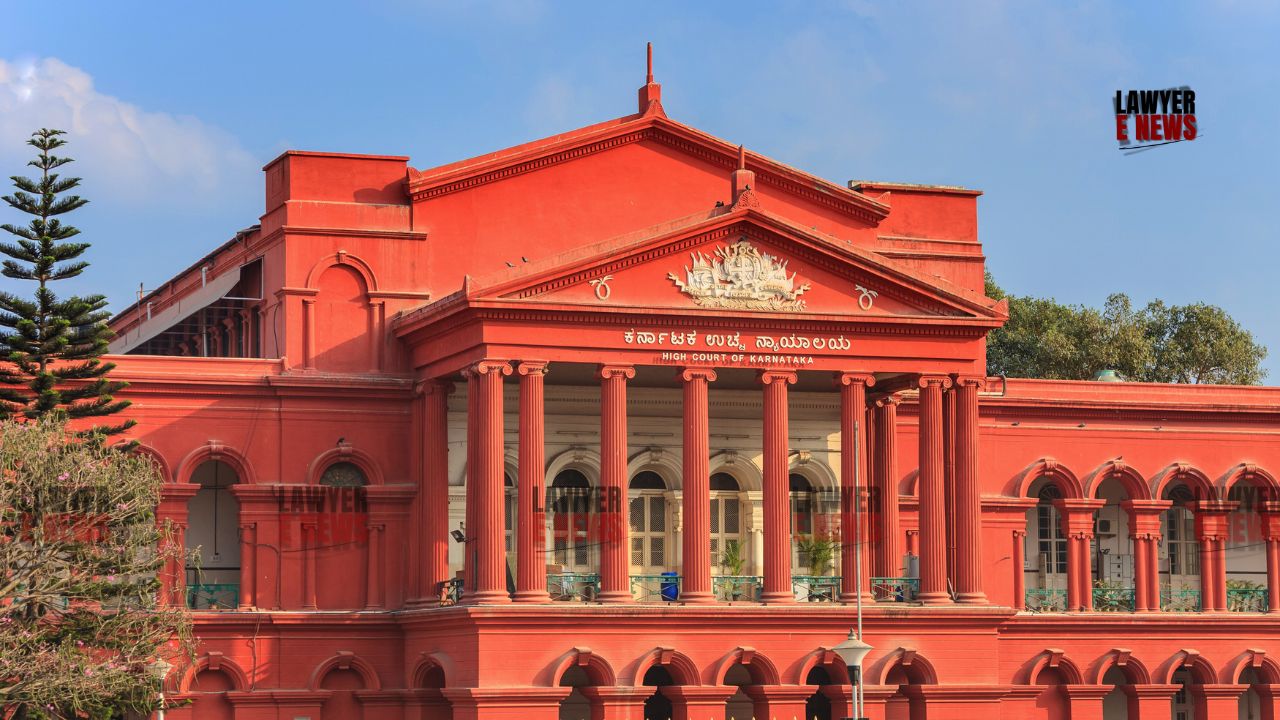-
by Admin
15 February 2026 5:01 PM



In a landmark decision Karnataka High Court set aside the conviction and life sentence imposed on the appellants, Rudresh T. (Accused No. 1) and Amitha @ Devaki (Accused No. 2), by the trial court in Sessions Case No. 79/2014. The two had been convicted for murder, conspiracy, and other charges under Sections 302, 120-A, 201, and 203 read with Section 34 of the Indian Penal Code (IPC) in connection with the alleged murder of Annayya Gowda.
In allowing the appeals (Criminal Appeal Nos. 1156 and 1049 of 2018), the High Court observed:
“Suspicion, however strong, cannot replace proof beyond reasonable doubt. The prosecution’s evidence in this case, resting entirely on circumstantial evidence, fails to establish the guilt of the accused conclusively.”
The Court acquitted both accused, finding that the prosecution failed to prove the alleged conspiracy, motive, or last-seen theory and that the circumstantial evidence presented was insufficient to sustain a conviction.
The case arose from the alleged murder of Annayya Gowda on April 19, 2014, in Dakshina Kannada district. The prosecution alleged that Amitha @ Devaki (Accused No. 2), wife of the deceased, was in an illicit relationship with Rudresh T. (Accused No. 1), a forest officer. It was alleged that, motivated by their illicit relationship, the accused conspired to kill Gowda.
According to the prosecution, the accused initially attempted to kill Gowda by giving him an electric shock. After Gowda survived, the accused allegedly planned and executed his murder by assaulting him with an iron rod, causing fatal injuries. To cover up the crime, the accused allegedly staged the scene to make it appear as if the house was broken into by unknown intruders.
The trial court, relying on circumstantial evidence such as the recovery of alleged murder weapons, the testimony of a “last-seen” witness, and claims of illicit relations, convicted the accused.
“Circumstantial Evidence Must Exclude All Other Hypotheses”
The High Court reiterated the well-established principle that, in cases based on circumstantial evidence, the prosecution must establish an unbroken chain of events that point conclusively to the guilt of the accused. The Court cited Sharad Birdhichand Sarda v. State of Maharashtra, (1984) 4 SCC 116, where the Supreme Court held:
“The facts established must be consistent only with the hypothesis of guilt and exclude every possible hypothesis except the one to be proved.”
In this case, the Court found that the prosecution failed to meet this standard. It noted:
“The chain of circumstantial evidence is riddled with gaps and does not conclusively point to the guilt of the accused. The evidence adduced by the prosecution is insufficient to exclude all other hypotheses.”
“Last-Seen Theory Lacks Credibility”
The prosecution relied on the testimony of PW-6, who claimed to have seen Accused No. 1 near the house of the deceased on the night of the murder. However, the Court found multiple inconsistencies in his testimony, including delays in reporting the sighting and the lack of corroborative evidence.
The Court observed: “PW-6’s evidence does not inspire confidence. His failure to report the alleged sighting immediately, coupled with contradictions in his testimony, renders the last-seen theory unreliable. The trial court erred in accepting this unsubstantiated evidence as proof of guilt.”
“Motive Based on Alleged Illicit Relationship Not Substantiated”
The prosecution argued that the accused killed Gowda to sustain their alleged illicit relationship. However, the Court found that the evidence for this claim was primarily hearsay and lacked corroboration.
The Court stated: “Allegations of illicit relationships must be supported by credible evidence to establish motive. In this case, the prosecution relied on hearsay testimony from PW-3, PW-4, and PW-5, which is insufficient to prove motive. Moreover, the defense effectively demonstrated existing disputes between the deceased and his brothers, providing an alternate hypothesis.”
“Recovery of Material Objects Does Not Prove Guilt”
The prosecution presented material objects, including bloodstained clothes and an iron rod, allegedly recovered at the instance of the accused. However, the Court found that the recoveries were not adequately linked to the crime.
The Court noted: “While the prosecution recovered bloodstained clothes from Accused No. 1 and an iron rod from the house of Accused No. 2, these recoveries do not conclusively prove their involvement. The blood group of the deceased was not conclusively matched to the stains, and the recovery alone cannot establish guilt beyond reasonable doubt.”
The Court also referred to Raja Naykar v. State of Chhattisgarh, 2023 SCC OnLine SC 870, where it was held:
“Suspicion, no matter how strong, cannot substitute for proof beyond reasonable doubt. Recoveries unsupported by conclusive forensic evidence cannot form the sole basis for conviction.”
“Benefit of Doubt Must Be Given to the Accused”
The Court emphasized the importance of adhering to the presumption of innocence in criminal cases, noting:
“The prosecution’s failure to establish a complete chain of evidence consistent with the guilt of the accused entitles the appellants to the benefit of doubt. Conviction based on conjecture or incomplete evidence cannot be sustained.”
Allowing the appeals, the High Court set aside the conviction and sentence imposed by the trial court and acquitted both accused. It directed:
“The Criminal Appeals are allowed. The judgment of conviction dated 03.05.2018 and order on sentence dated 08.05.2018 passed by the I Additional District and Sessions Judge, D.K. Mangaluru, in Sessions Case No. 79/2014, are set aside. The accused are acquitted of all charges, and their bail bonds are canceled.”
The Court further ordered that any fine deposited by the appellants be refunded.
Date of Decision: January 13, 2025
